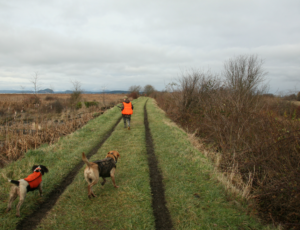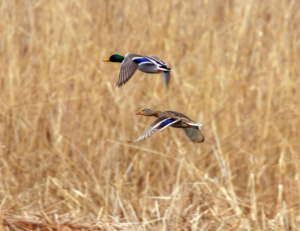Policy Corner Brief: JUNE 2024

CSF SUPPORTS LAND CONSERVATION LEGISLATION IN NORTH CAROLINA
ARTICLE CONTACT: CONNER BARKER
Why It Matters: With North Carolina being one of the most rapidly growing states in the country, it is increasingly important to support landowners interested in conserving their property. North Carolina’s private lands provide important access for hunting and fishing, but as properties are developed, wildlife habitat and hunting and fishing access is often lost.
Highlights
- Last year, North Carolina Legislative Sportsmen’s Caucus (Caucus) Member Representative Stephen Ross, along with former Caucus Co-Chair Representative John Bell, current Caucus Co-Chair Representative Michael Wray, and Caucus Member Representative Jimmy Dixon, introduced legislation to support land conservation efforts in the state.
- As part of the two-year session, House Bill 290 the Protect NC’s Military and Working Lands Act (Act), is still up for consideration before the General Assembly.
- The Act would offer state income tax credits to landowners who donate interests in real property for conservation purposes.
With North Carolina among one of the fastest growing states in the country, proactive efforts to conserve private lands are essential for protecting our time-honored traditions. As farms and forestlands are purchased, they are often subdivided and developed which leads to the loss of hunting and fishing access and fragmentation of fish and wildlife habitat. Incentives like state level tax credits for conservation easements, reduced fee title, and/or donated land for conservation purposes are all tools that states can use to conserve fish and wildlife habitat.
House Bill 290 would allow for an up to 25 percent state tax credit of the fair market value of the donated property of interest for the following purposes: farmland preservation, fish and wildlife conservation, floodplain protection, historic landscape conservation, public trail access, and buffers for military installations.
Prior to sunsetting in 2013, a previous version of this state income tax program led to a 20 percent increase in overall land donations and is credited with protecting 250,000 acres in North Carolina. Other Southeastern states like Georgia, South Carolina, and Virginia have similar acts in place that have been successful in conserving private lands.
The Congressional Sportsmen’s Foundation (CSF) submitted a letter of support to House and Senate leadership encouraging them to move the bill this year. Similar provisions were included in the budget that the House passed last year. CSF supports the intent of House Bill 290 whether through standalone legislation or as part of a larger legislative package. CSF applauds the North Carolina Legislative Sportsmen’s Caucus and partners for their work to incentivize private land conservation in the Tar Heel State.
States Involved: NC
CSF CELEBRATES THE EFFECTIVENESS OF THE CSC WITH SOME HEALTHY COMPETITION AT ANNUAL CONGRESSIONAL CLAYS EVENT
Washington D.C. (May 14, 2024) – Earlier today, Members of the Congressional Sportsmen’s Caucus (CSC) and industry partners gathered for a day of fun and fierce competition at the Congressional Sportsmen’s Foundation’s (CSF) annual bipartisan Congressional Clays Competition, hosted at the premier Prince George’s County Trap and Skeet Center.
This unique sporting clay, trap, and skeet shooting event provides an unparalleled opportunity for attendees to connect with each other and enjoy the great outdoors together. The day started at 10 a.m. with registration and warm-ups, and soon after the bipartisan shooting competition commenced – ending in the afternoon with lunch and a “bragging rights” ceremony.
“Enjoying our time-honored traditions at events like this gives us all the opportunity to set party lines aside, and to celebrate our vast similarities,” said CSF President and CEO Jeff Crane. “In a time where the divide between parties can seem deeper than ever, the CSC’s noteworthy ability to work across the aisle to protect and promote America’s rich sporting heritage is something worth celebrating, and the Congressional Clays Competition is the perfect event to do so. It is all thanks to our great partners and industry allies, as well as the incredible work by the CSC, that days like this are possible.”
Made up of nearly 250 members of the House and Senate, the Congressional Sportsmen’s Caucus is the largest, most active bipartisan caucus in Congress, renowned for its unparalleled effectiveness and dedication to advancing the interests of America’s 55 million sportsmen and women. The CSC is truly the champion of sportsmen and women in Washington D.C. and has certainly lived up to this reputation in 2024 – spearheading several critical pieces of legislation including the EXPLORE Act, America’s Conservation Enhancement Reauthorization Act, the Protecting Access for Hunters & Anglers Act, and more.
CSF would like to express our gratitude to the Mission Partners and sponsors who helped make this such a successful event. Title Sponsors include Bass Prop Shops; Cabela’s; Outdoor Sportsman Group; and Richard Childress Racing. Host Sponsors include Dallas Safari Club; Ducks Unlimited; Ecentria; Hornady Manufacturing, Inc.; International Order of T. Roosevelt; National Shooting Sports Foundation; Safari Club International; Scheels; Shimano; Silencer Central; and Vista Outdoor Inc. Co-Host Sponsors include Airline Pilots Association, INT’L; Conservative Partnership Institute; Federal Premium Ammunition; Koch Industries; Lockheed Martin; National Rifle Association; Retay; Shumaker; Silencer Shop; The Kinetic Group; White Flyer Targets; Winchester; and Yamaha.
 Members of the Congressional Sportsmen’s Caucus Gather for Annual Congressional Clays Event.
Members of the Congressional Sportsmen’s Caucus Gather for Annual Congressional Clays Event.
Clays Competition Awards:
Congressional Sportsmen’s Caucus Individual Category
- “Top Gun” Member of Congress: Rep. John Rutherford (FL)
- “Top Gun” Democrat: Rep. Mike Thompson (CA)
- “Top Gun” Republican: Rep. Jeff Duncan (SC)
- Top Skeet: Rep. Bill Huizenga (MI)
- Top Trap: Rep. Richard Hudson (NC)
- Top Sporting Clays: Rep. Gabe Vasquez (NM)
Attendees Category
- “Top Gun”: Chuck Richardson
- “Top Gun” Beginner: Sarah Jorgenson
- “Top Gun” Female: Pamela Meara
- Top Skeet: Robert Crow
- Top Trap: Forrest Wilson
- Top Sporting Clays: Marshall Conrad
HOUSE AGRICULTURE COMMITTEE PASSES FARM BILL REAUTHORIZATION WITH TOP CSF PRIORITIES INCLUDED
ARTICLE CONTACT: KENT KEENE
Why It Matters: After expiring last year, leaders in the House and Senate are making progress toward the next iteration of the legislation. Last week, the House Agriculture Committee held a markup for a Farm Bill led by Committee Chairman Congressman G.T. Thompson. This hearing marks an important step toward the development and passage of the next Farm Bill. However, both House and Senate Agriculture Committee leaders are calling for bipartisan legislation, adding another layer of complexity to the conversation given the diverse priorities at play. Fortunately, both House and Senate iterations of the Farm Bill contain several priorities identified by the sporting-conservation community.
Highlights:
- Last week, the House Agriculture Committee held a markup to advance H.R. 8467, the Farm, Food, and National Security Act of 2024, out of Committee, a major step in the path toward a reauthorization of the Farm Bill.
- In Chairman Thompson’s bill, as well as in the legislation introduced in the Senate by Chairwoman Stabenow, sportsmen and women have celebrated the inclusion of many conservation priorities in the next iteration of the Farm Bill.
- The Congressional Sportsmen’s Foundation (CSF) remains engaged in the process, advocating for robust investments in fish and wildlife habitat conservation in the Farm Bill’s Conservation and Forestry Titles.
Despite the many hurdles that remain ahead of Congress as they debate the next iteration of the Farm Bill, the House Agriculture Committee took an important first step last week by holding a markup for the recently introduced Farm, Food, and National Security Act of 2024. This legislation, authored and led by House Agriculture Committee Chairman and Congressional Sportsmen’s Caucus (CSC) Member Representative G.T. Thompson, includes many priorities identified by CSF as it relates to the Farm Bill’s Conservation and Forestry Titles.
Priorities of note included in the draft Farm Bill include increased funding for critical conservation programs such as the Environmental Quality Incentives Program (EQIP), Conservation Stewardship Program (CSP), Agricultural Conservation Easement Program (ACEP), and Regional Conservation Partnership Program (RCPP). Likewise, Chairman’s Thompson’s bill also includes increased funding for the Voluntary Public Access – Habitat Incentive Program (VPA-HIP), an important access program for sportsmen and women, and the Feral Swine Eradication and Control Program. Finally, on the forestry side and in addition to other support for active forest management, the draft bill includes the widely supported Forest Conservation Easement Program (FCEP), a top priority for CSF and many partners.
In addition to the House Agriculture Committee’s markup of their version of the Farm Bill, members of the sporting-conservation community were also highlighting the inclusion of many priorities in the recently released framework for the Senate’s Rural Prosperity and Food Security Act led by Senate Agriculture, Nutrition, and Forestry Committee Chairwoman and CSC Member Debbie Stabenow. Recognizing this, sportsmen and women should remain optimistic about the forthcoming investments in conservation that the next Farm Bill could bring. Though partisan priorities may slow the legislations’ progress, support for conservation from both sides of the aisle remains strong.
CSF looks forward to working with both the House and Senate Agriculture Committees to see a robust Farm Bill signed into law in 2024.
FWS MOVES QUICKLY TO IMPLEMENT CSF PRIORITY, DUCK STAMP MODERNIZATION ACT
ARTICLE CONTACT: TAYLOR SCHMITZ
Why It Matters: At a time when technology continues to rapidly change the way in which Americans live, it is important that our outdoor traditions keep up with the times. Allowing hunters to have an electronic copy of their federal duck stamp on their smartphone for the entirety of the hunting season will bring the federal duck stamp process into the 21st century and simplify the process for sportsmen and women.
Highlights:
- Last Friday, the U.S. Fish and Wildlife Service (FWS) announced that waterfowl hunters will be able to fully take advantage of the Duck Stamp Modernization Act for the 2024 – 2025 hunting season, making a Congressional Sportsmen’s Foundation (CSF) priority a reality.
- CSF extends our appreciation to FWS for quickly working to allow hunters to take advantage of the Duck Stamp Modernization and for recognizing the need to modernize to the way in which sportsmen and women enjoy our time-honored traditions.
- The Duck Stamp Modernization Act, which was signed into law in December 2023, was led by Congressional Sportsmen’s Caucus (CSC) Leaders Sens. Boozman, Manchin, Marshall, and King, and in the House by CSC leader Rep. Garret Graves as well as CSC Member Rep. Mike Thompson.
Last week, the U.S. Fish and Wildlife Service announced that the Duck Stamp Modernization Act, a top priority for CSF, will be in full effect for hunters for the 2024 – 2025 waterfowl season. CSF appreciates the FWS’s swift action to allow waterfowl hunters to take full advantage of this modernization for the upcoming hunting season. CSF also thanks the Congressional Sportsmen’s Leaders and Members for their commitment to sportsmen and women through this legislation.
Over the last year, the Congressional Sportsmen’s Foundation has been leading an effort to modernize the federal duck stamp process through the Duck Stamp Modernization Act. Prior to the bill becoming law, CSF worked to shepherd this bill through the legislative process, and as a result, the bill passed Congress with wide-spread support. Immediately, following enactment of the legislation, CSF been working with the FWS to see this effort become a reality.
Now that the legislation has been implemented by FWS, the Duck Stamp Modernization Act will simplify the Federal Duck Stamp process by allowing hunters to have an electronic duck stamp on their smartphone for the entirety of the hunting season. Prior to implementation of this legislation, when a hunter purchased an electronic Federal Duck Stamp (e-stamp), the e-stamp was only valid for a period of 45 days to allow for the actual stamp to be mailed. Once the actual stamp was received by the e-stamp purchaser, the actual stamp had to be signed by the respective hunter across the face of the stamp and be in the hunter’s possession while afield. However, this legislation and announcement will remove the 45-day validation period and make the electronic stamp valid for the entirety of the hunting season. To ensure the continuance and integrity of the Federal Duck Stamp art contest, a longstanding tradition for waterfowlers and other bird enthusiasts alike, purchasers of e-stamps will still receive the actual stamp in the mail. Specifically, actual stamps will be mailed to purchasers from March 10 to June 30.
Since being signed into law in 1934, the Federal Duck Stamp has generated over $1.2 billion for wetlands conservation and has helped conserve over 6 million acres of wetlands within the National Wildlife Refuge System, making this program one of the best conservation investments we can make. CSF appreciates FWS working quickly to modernize the program and allow for hunters to fully take advantage of the electronic federal duck stamp.
INCREDIBLY QUIET LEGISLATIVE SESSION ADJOURNS IN THE SHOW-ME STATE
ARTICLE CONTACT: KENT KEENE
Why It Matters: Throughout many Midwestern states, much of the low-hanging fruit has already been enacted for the benefit of sportsmen and women. However, these successes do not mean that the sporting-conservation community should rest on our laurels, and we must remain vigilant to emergent threats to our time-honored outdoor traditions. The Congressional Sportsmen’s Foundation (CSF) remains actively engaged with the highly successful Missouri Legislative Sportsmen’s Caucus and in-state partners to ensure that our outdoor heritage remains protected from threats that could undermine opportunities for sportsmen and women.
Highlights
- The 2024 regular session of the Missouri Legislature adjourned last week, completing one of the quietest sessions for sportsmen and women in recent memory.
- With much of the low-hanging fruit already adopted by the legislature, coupled with the constitutional authority vested in the Missouri Conservation Commission, most efforts in Missouri involve playing defense against threat to our outdoor heritage.
- Fortunately, the continued strength and engagement of the Missouri Legislative Sportsmen’s Caucus, thanks largely to its bipartisan leadership, has successfully mitigated the threats that are becoming increasingly common in neighboring states throughout the region.
Knowledge is power. For sportsmen and women who are engaged in the political processes across the nation, knowledge often manifests in the form of understanding the North American Model of Wildlife Conservation and the American System of Conservation Funding. Through these two enormous concepts, the role of sportsmen and women, and the importance of our shared outdoor heritage, truly shines. Recently, no state in the Midwest has demonstrated the possession of this knowledge better than the Show-Me State. Thanks largely to the engagement of both the leaders and members of the Missouri Legislative Sportsmen’s Caucus, the Missouri Department of Conservation (MDC) and their Commission, and key in-state partners, Missouri’s most recent legislative session serves as a demonstration that knowledge surrounding conservation and the role of sportsmen and women is winning the day.
After adjourning Sine Die last week, the Missouri Legislature officially turned the page on what has been among the quietest legislative sessions in recent memory. For a state constantly facing threats to the dedicated conservation sales tax, complaints about the efforts of the MDC, and other challenges that would impact sportsmen and women, the 2024 session saw nearly zero truly serious threats to conservation or opportunities for our community. Why was this the case?
First, the situation in Missouri demonstrates the value that an active, engaged Sportsmen’s Caucus can bring to the conversation. Thanks to the relationships that the Caucus, led by bipartisan legislators that are able to work collectively on behalf of sportsmen and women, relationships between elected officials and members of the sporting-conservation community have arguably never been stronger. This can be seen both during the Caucus’ events which feature great conversations about our shared outdoor passions, as well as through the almost complete lack of anti-sportsmen or anti-conservation legislation that made any significant progress this session.
As we begin to look towards 2025, CSF is proud of the work accomplished in Missouri and looks forward to continuing our work there and with all caucuses throughout the National Assembly of Sportsmen’s Caucuses (NASC) network.
States Involved: MO
DELAWARE’S GOVERNOR SIGNS CSF PRIORITY SUNDAY HUNTING BILL INTO LAW
May 30, 2024 (Dover, Delaware) – Moments ago, Delaware Governor John Carney, a member of the Governor’s Sportsmen’s Caucus (GSC), signed House Bill 271 (HB 271) into law, removing the longstanding prohibition on Sunday gamebird hunting in Delaware. Delaware’s definition of game birds includes waterfowl, rails, wild turkeys, pheasants, quail, chukar, and doves, amongst others.
In 2016, the Delaware Legislative Sportsmen’s Caucus spearheaded the passage of HB 289, which permits deer hunting on both private and public lands (subject to approval of the appropriate regulatory body) on five Sundays during firearms seasons. In 2018, the Caucus took further steps for access and opportunity by passing SB 198, which opened hunting every Sunday throughout the state’s archery and firearm deer seasons. Previously, section 712 of Title 7 of the Delaware Code prohibited the hunting of any game birds or game animals (except deer) on Sundays. The enactment of this legislation will remove this prohibition against hunting game birds on Sunday and will substantially expand opportunities for sportsmen and women of the First State.
By lifting the current prohibition, the Delaware Department of Natural Resources and Environmental Control’s (DNREC) Division of Fish and Wildlife will continue to have the authority to establish and regulate season dates, bag limits and enforcement for the hunting of game birds but will gain the ability to add Sundays to the existing game bird seasons.
Delaware Legislative Sportsmen’s Caucus Member, Rep. William Carson, was the primary sponsor of HB 271, with his fellow Co-Chairs and co-sponsors, Sen. Nicole Poore, Sen. Brian Pettyjohn, and Rep. Jeff Spiegelman. HB 271 passed both the House and Senate unanimously, a show of widespread support for our time-honored traditions and for expanding opportunities for Delaware’s hunters.
“I’d like to thank Governor Carney for signing this piece of legislation. Over the last several years in Delaware we have made great strides in providing new opportunities for hunters in the First State,” said Delaware Legislative Sportsmen’s Caucus Co-Chair, Representative Jeff Spiegelman. “By having another day to get outside during the weekend to enjoy our natural heritage we are making it easier to retain current hunters and recruit the next generation to the sport we love”.
The next step in this process falls to the Delaware Department of Natural Resources and Environmental Control to implement Sunday gamebird hunting as they continue to have the authority to establish and regulate season dates, bag limits and enforcement for the hunting of game birds. CSF fully anticipates that DNREC will implement Sunday gamebird hunting. Waterfowlers and visitors of the First State should expect to see this change as early as the 2024-2025 waterfowl hunting season, followed by the 2025 spring turkey season.
CSF applauds the Delaware Legislative Sportsmen’s Caucus, Secretary Garvin, and Governor Carney for putting the sportsmen and women of the First State, first. Allowing sportsmen and women the opportunity to partake in our treasured outdoor heritage without restricting access is key in successfully continuing to recruit, retain, and reactivate hunters. CSF looks forward to working with DNREC as they move forward with implementing Sunday gamebird hunting.
ARKANSAS GOVERNOR CALLS SPECIAL SESSION TO FUND ARKANSAS GAME AND FISH COMMISSION
ARTICLE CONTACT: KENT KEENE
Why It Matters: Despite the Arkansas Game and Fish Commission (AGFC) being one of a handful of state fish and wildlife agencies whose authority is vested via the state’s Constitution, the agency’s budget is still subject to approval by the General Assembly. After adjourning their fiscal session without approving a budget for the AGFC, Governor Sarah Huckabee Sanders’ call for a special session is a critical step to ensure that the agency can financially continue their mission on behalf of the citizens, and sportsmen and women, of Arkansas.
Highlights:
- Earlier this year, the Arkansas General Assembly adjourned their shortened fiscal session without making an appropriation for the budget of the Arkansas Game and Fish Commission.
- Despite the efforts of the leaders of the Arkansas Legislative Sportsmen’s Caucus to rally support around the agency’s budget proposals, the effort stalled and the session adjourned without an approved budget for the agency.
- This special session will allow the General Assembly to rectify this situation while ensuring that the agency is able to financially continue its operations in the Natural State.
The Arkansas Game and Fish Commission’s authority over the Natural State’s fish and wildlife resources is officially vested solely in the AGFC through the state’s Constitution. However, the agency’s budget is still subject to appropriations by the Arkansas General Assembly. As the sole source of power that the legislature wields over the AGFC, the 2024 fiscal session saw a few legislators successfully stall the appropriations process for the agency due to differing opinions regarding the agency’s management decisions. Fortunately, Governor Sanders called for the General Assembly to convene a special session to ensure that the agency is funded, among other things.
While Arkansas’ Constitution does a great job ensuring that management authority remains vested in the Game and Fish Commission and is informed by those most knowledgeable and best equipped to make wildlife management decisions, the current events in Arkansas demonstrate that even the best systems can still be subject to challenges caused by differences in opinion. However, with the Governor’s swift action and the efforts of the leaders of the Arkansas Legislative Sportsmen’s Caucus, it is unlikely that these impacts will continue past the end of the agency’s current fiscal year, effectively preventing and negative consequences.
While Arkansas returns for their Special Session, the Congressional Sportsmen’s Foundation (CSF) and partners are working closely with elected officials to address other challenges facing the sporting-conservation community in the state. Stay tuned for further updates as these efforts progress.
States Involved: AR
CSC CO-CHAIR SENATOR BOOZMAN RELEASES PRO-SPORTSMEN FARM BILL PLATFORM
ARTICLE CONTACT: KENT KEENE
Why It Matters: After passing out of the House Agriculture Committee last month, movement around the next iteration of the Farm Bill continues in Washington. While debate around the final, bipartisan version of the bill remains, Ranking Member Boozman’s release of his Farm Bill priorities highlights the ongoing support for key conservation programs within the legislation, mirroring many of the sportsmen-supported provisions included in the House version of the Bill.
Highlights:
- Last week, Congressional Sportsmen’s Caucus (CSC) Co-Chair and Ranking Member of the Senate Committee on Agriculture, Nutrition, and Forestry, Senator John Boozman, released his framework and priorities for the next Farm Bill.
- While differing in several ways from the priorities established by Committee Chairwoman and CSC Member Senator Stabenow, Senator Boozman’s priorities include many provisions widely supported by the sporting-conservation community.
- While much debate remains before a Farm Bill is passed by Congress, this movement highlights the ongoing support for many of our community’s priorities within this important piece of legislation.
Last week, Congressional Sportsmen’s Caucus Co-Chair and Ranking Member of the Senate Committee on Agriculture, Nutrition, and Forestry Senator John Boozman released the minority party’s platform for the next iteration of the Farm Bill. This suite of priorities largely aligns with the version of the Farm Bill that was passed out of the House Agriculture Committee last month, and includes several key provisions widely supported by the Congressional Sportsmen’s Foundation (CSF) and the sporting-conservation community.
While there are many key differences between these Republican priorities and the platform released earlier this year by CSC Member and Committee Chairwoman Debbie Stabenow, it is important to note that most of these differences occur outside of the Farm Bill’s Conservation and Forestry Titles. As it relates to these titles most important to the priorities of sportsmen and women, both sides of the aisle have demonstrated a general support for the Farm Bill’s conservation provisions.
CSF appreciates the Conservation and Forestry Title priorities set forth by Ranking Member Boozman, including his support for the creation of a Forest Conservation Easement Program, increased funding for the Voluntary Access – Habitat Incentives Program, and an overall expansion in the reach of several other programs that support quality wildlife habitat conservation. We look forward to our continued work with Congress and the Sporting-Conservation Community as we seek to pass and enact the next Farm Bill.
SHARE ON
You may also like
The role corn plays for gamebirds and economies ac...
Sportsmen’s conservation policy issues from publ...
Sportsmen’s conservation policy issues from publ...































